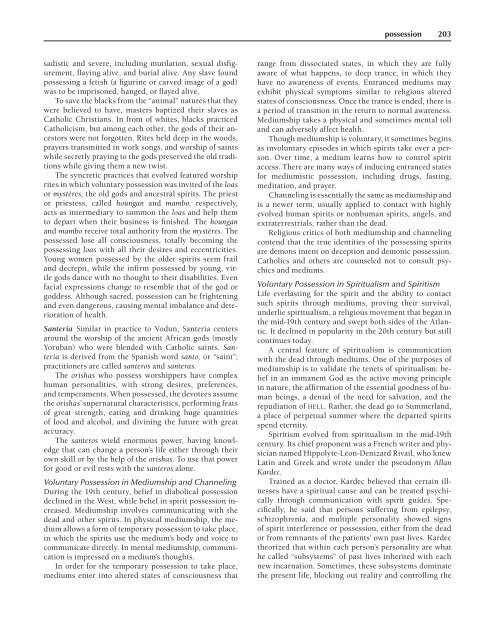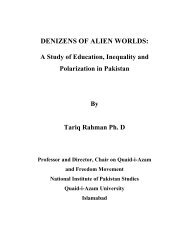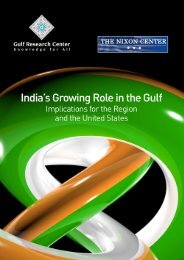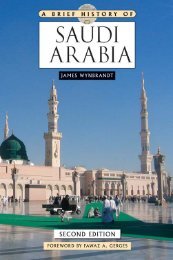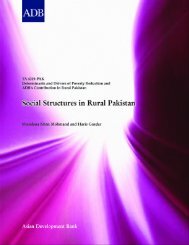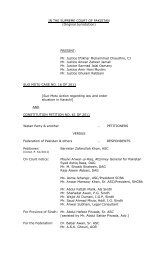The Encyclopedia Of Demons And Demonology
The Encyclopedia Of Demons And Demonology
The Encyclopedia Of Demons And Demonology
You also want an ePaper? Increase the reach of your titles
YUMPU automatically turns print PDFs into web optimized ePapers that Google loves.
possession 203<br />
sadistic and severe, including mutilation, sexual disfigurement,<br />
flaying alive, and burial alive. Any slave found<br />
possessing a fetish (a figurine or carved image of a god)<br />
was to be imprisoned, hanged, or flayed alive.<br />
To save the blacks from the “animal” natures that they<br />
were believed to have, masters baptized their slaves as<br />
Catholic Christians. In front of whites, blacks practiced<br />
Catholicism, but among each other, the gods of their ancestors<br />
were not forgotten. Rites held deep in the woods,<br />
prayers transmitted in work songs, and worship of saints<br />
while secretly praying to the gods preserved the old traditions<br />
while giving them a new twist.<br />
<strong>The</strong> syncretic practices that evolved featured worship<br />
rites in which voluntary possession was invited of the loas<br />
or mystères, the old gods and ancestral spirits. <strong>The</strong> priest<br />
or priestess, called houngan and mambo, respectively,<br />
acts as intermediary to summon the loas and help them<br />
to depart when their business is finished. <strong>The</strong> houngan<br />
and mambo receive total authority from the mystères. <strong>The</strong><br />
possessed lose all consciousness, totally becoming the<br />
possessing loas with all their desires and eccentricities.<br />
Young women possessed by the older spirits seem frail<br />
and decrepit, while the infirm possessed by young, virile<br />
gods dance with no thought to their disabilities. Even<br />
facial expressions change to resemble that of the god or<br />
goddess. Although sacred, possession can be frightening<br />
and even dangerous, causing mental imbalance and deterioration<br />
of health.<br />
Santeria Similar in practice to Vodun, Santeria centers<br />
around the worship of the ancient African gods (mostly<br />
Yoruban) who were blended with Catholic saints. Santeria<br />
is derived from the Spanish word santo, or “saint”;<br />
practitioners are called santeros and santeras.<br />
<strong>The</strong> orishas who possess worshippers have complex<br />
human personalities, with strong desires, preferences,<br />
and temperaments. When possessed, the devotees assume<br />
the orishas’ supernatural characteristics, performing feats<br />
of great strength, eating and drinking huge quantities<br />
of food and alcohol, and divining the future with great<br />
accuracy.<br />
<strong>The</strong> santeros wield enormous power, having knowledge<br />
that can change a person’s life either through their<br />
own skill or by the help of the orishas. To use that power<br />
for good or evil rests with the santeros alone.<br />
Voluntary Possession in Mediumship and Channeling<br />
During the 19th century, belief in diabolical possession<br />
declined in the West, while belief in spirit possession increased.<br />
Mediumship involves communicating with the<br />
dead and other spirits. In physical mediumship, the medium<br />
allows a form of temporary possession to take place,<br />
in which the spirits use the medium’s body and voice to<br />
communicate directly. In mental mediumship, communication<br />
is impressed on a medium’s thoughts.<br />
In order for the temporary possession to take place,<br />
mediums enter into altered states of consciousness that<br />
range from dissociated states, in which they are fully<br />
aware of what happens, to deep trance, in which they<br />
have no awareness of events. Entranced mediums may<br />
exhibit physical symptoms similar to religious altered<br />
states of consciousness. Once the trance is ended, there is<br />
a period of transition in the return to normal awareness.<br />
Mediumship takes a physical and sometimes mental toll<br />
and can adversely affect health.<br />
Though mediumship is voluntary, it sometimes begins<br />
as involuntary episodes in which spirits take over a person.<br />
Over time, a medium learns how to control spirit<br />
access. <strong>The</strong>re are many ways of inducing entranced states<br />
for mediumistic possession, including drugs, fasting,<br />
meditation, and prayer.<br />
Channeling is essentially the same as mediumship and<br />
is a newer term, usually applied to contact with highly<br />
evolved human spirits or nonhuman spirits, angels, and<br />
extraterrestrials, rather than the dead.<br />
Religious critics of both mediumship and channeling<br />
contend that the true identities of the possessing spirits<br />
are demons intent on deception and demonic possession.<br />
Catholics and others are counseled not to consult psychics<br />
and mediums.<br />
Voluntary Possession in Spiritualism and Spiritism<br />
Life everlasting for the spirit and the ability to contact<br />
such spirits through mediums, proving their survival,<br />
underlie spiritualism, a religious movement that began in<br />
the mid-19th century and swept both sides of the Atlantic.<br />
It declined in popularity in the 20th century but still<br />
continues today.<br />
A central feature of spiritualism is communication<br />
with the dead through mediums. One of the purposes of<br />
mediumship is to validate the tenets of spiritualism: belief<br />
in an immanent God as the active moving principle<br />
in nature, the affirmation of the essential goodness of human<br />
beings, a denial of the need for salvation, and the<br />
repudiation of HELL. Rather, the dead go to Summerland,<br />
a place of perpetual summer where the departed spirits<br />
spend eternity.<br />
Spiritism evolved from spiritualism in the mid-19th<br />
century. Its chief proponent was a French writer and physician<br />
named Hippolyte-Léon-Denizard Rivail, who knew<br />
Latin and Greek and wrote under the pseudonym Allan<br />
Kardec.<br />
Trained as a doctor, Kardec believed that certain illnesses<br />
have a spiritual cause and can be treated psychically<br />
through communication with spirit guides. Specifically,<br />
he said that persons suffering from epilepsy,<br />
schizophrenia, and multiple personality showed signs<br />
of spirit interference or possession, either from the dead<br />
or from remnants of the patients’ own past lives. Kardec<br />
theorized that within each person’s personality are what<br />
he called “subsystems” of past lives inherited with each<br />
new incarnation. Sometimes, these subsystems dominate<br />
the present life, blocking out reality and controlling the


